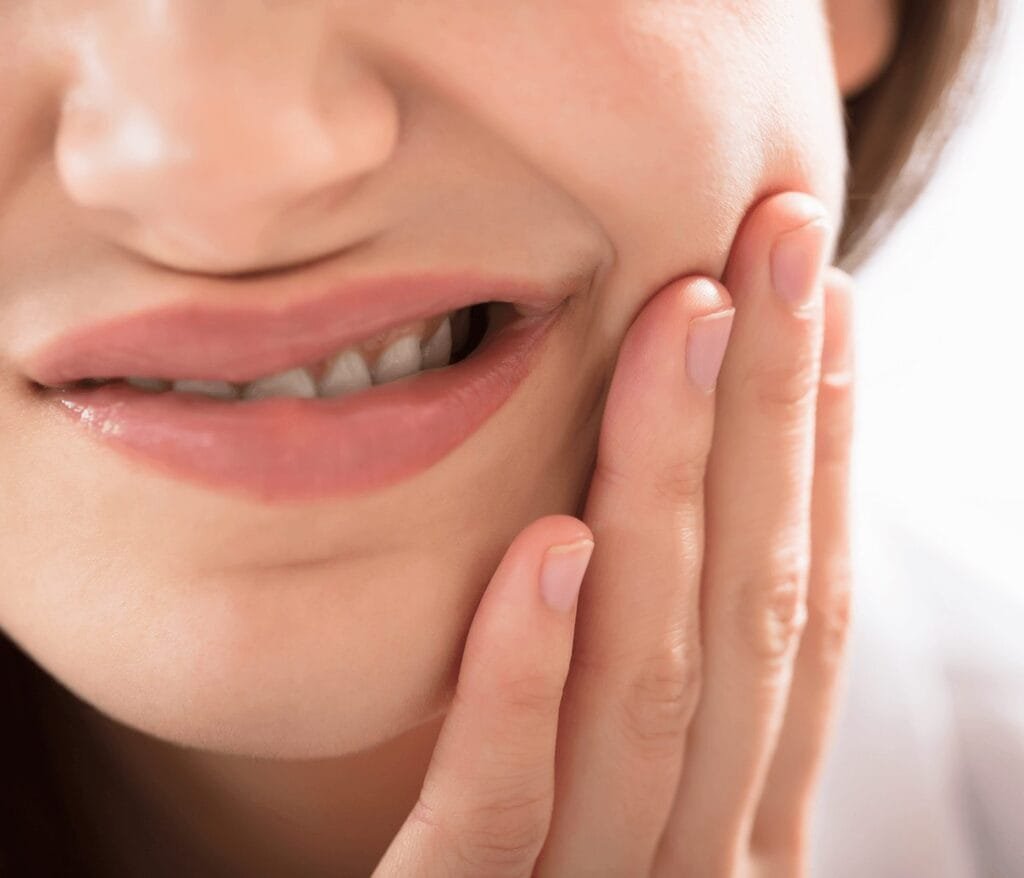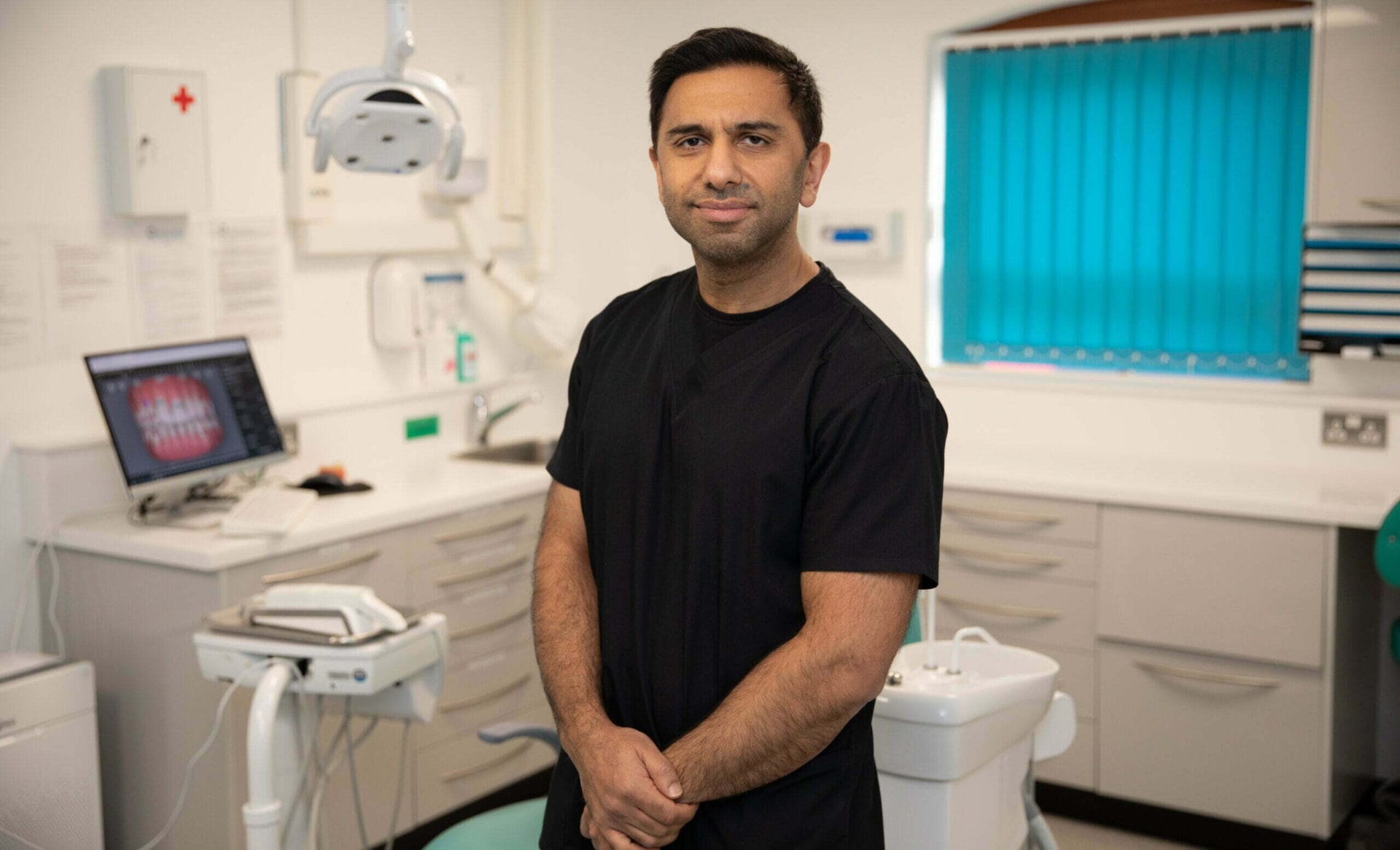
If you have sensitive teeth, you’ll know it can make everyday activities like eating, drinking, and even breathing cold air, painful and uncomfortable. So, how can you make your teeth less sensitive and go back to enjoying these simple things?
The answer comes in understanding and addressing the causes of tooth sensitivity.
In this blog, we’ll look at what contributes to tooth sensitivity and share practical tips on how to make your day-to-day life more comfortable. Let’s take a look.
- What Causes Tooth Sensitivity?
- How Can I Protect My Teeth From Sensitivity?
- Will Tooth Sensitivity Go Away?
- Treat Your Sensitive Teeth Today
What Causes Tooth Sensitivity?
There are a number of things that could be causing your tooth sensitivity; let’s run through some of the main ones:
Dental Issues
Dental issues, such as tooth cavities, commonly cause tooth sensitivity.
Cavities happen when the hard surface of your teeth is damaged by the acid-producing bacteria in plaque. This leads to small holes in the tooth that expose the sensitive inner layers.
Unless treated with a root canal, cavities can reach the deep layers of your tooth and cause sharp pain and sensitivity. This procedure involves removing the damaged pulp, cleaning the inner chambers of the tooth, and sealing it to protect against further damage.
Bruxism
Bruxism, or tooth grinding, usually happens when we sleep. The extra strain this puts on our mouth and jaw can wear away our protective enamel over time, leading to much more sensitive teeth throughout the day.
Acidic Foods and Drinks
Your diet plays a big role in the health and sensitivity of your teeth, especially when it comes to acidic foods and drinks. Common culprits include:
- Fizzy drinks
- Citrus fruits
- Wine
- Coffee
These can erode the enamel on your teeth and expose the sensitive dentin beneath.
Try keeping acidic foods to a minimum to reduce sensitivity, or pair them with meals to help protect enamel.
Gum Disease
Gum disease can also cause tooth sensitivity. It starts off as mild inflammation (gingivitis) and escalates to infection (periodontitis). This leads to receding gums, exposed root surface and – inevitably – sensitivity.
Other symptoms of gum disease include bleeding, swelling, and even tooth loss in severe cases.
Plaque Buildup
Plaque is a sticky film of bacteria that forms on your teeth and is one of the main causes of tooth sensitivity.
High-sugar diets, smoking, and poor oral hygiene can increase plaque buildup, which in turn can lead to tooth decay and gum disease. This buildup affects your dental health and causes tooth sensitivity by weakening your enamel and exposing the underlying layers of your teeth.
Abrasive Toothpaste
Surprisingly, some whitening toothpastes contain abrasive ingredients that wear down enamel and increase sensitivity. It’s important to choose a toothpaste that balances effectiveness with gentleness to avoid causing harm to your teeth.
How Can I Protect My Teeth From Sensitivity?
So, now we know some of the main causes of tooth sensitivity, how can you protect your teeth?
Fluoride Toothpaste
Using fluoride toothpaste can really benefit your oral health. Fluoride strengthens the enamel, helps prevent cavities, and reduces sensitivity. For the best protection, dentists recommend using fluoride toothpaste at least twice a day, making sure it has enough contact time with your teeth to be effective.
Soft-Bristled Toothbrushes
Using a soft-bristled toothbrush is gentle on your gums and enamel, reducing the risk of damage and sensitivity. It’s important to choose the right size and shape brush to comfortably reach all areas of your mouth, ensuring a thorough clean – even to the back molars – without any harm.
Mouth Guard
A mouth guard is a great tool for those who grind their teeth at night. It cushions your teeth and protects the enamel from damage, reducing sensitivity.
Fluoride Gels
Fluoride gels reduce oral discomfort and protect your teeth against acids and decay. Available in various forms, such as gels, toothpaste, and mouthwashes, they can be easily included in your daily dental care routine.
Potassium Nitrate
Found in many desensitising toothpastes, potassium nitrate soothes the nerves in your teeth, offering relief from sensitivity. It is naturally present in many vegetables, such as spinach, celery, and cabbage, making it easy for everyone to access.
Cold Foods and Drinks
To reduce sensitivity, avoid direct contact with teeth by sipping cold drinks through a straw and try to reduce how much sugary foods you eat. This can help prevent further irritation and protect your enamel.
Limiting Citrus Fruits and Soft Drinks
The acidity in citrus fruits and soft drinks can make tooth sensitivity worse by wearing down enamel. Limiting these in your diet helps protect your enamel and reduce sensitivity, ensuring your teeth remain healthier for longer.
Will Tooth Sensitivity Go Away?
Sometimes, tooth sensitivity can go away on its own, especially after dental work like a root canal. However, if you’ve tried all of the above solutions and you’re still struggling with a sore mouth, give our team a call – you may need a professional to get to the root of the problem.
Treat Your Sensitive Teeth Today
We understand that dealing with sensitive teeth can put a real strain on your day-to-day life. But that’s where our team of private dentists in Leeds comes in. You can count on us to diagnose the cause of your sensitivity and provide a personalised dental treatment plan to stop your discomfort. Don’t let tooth sensitivity hold you back from enjoying life to the fullest. Book a consultation, and let’s work together towards a healthier, more comfortable smile!



















